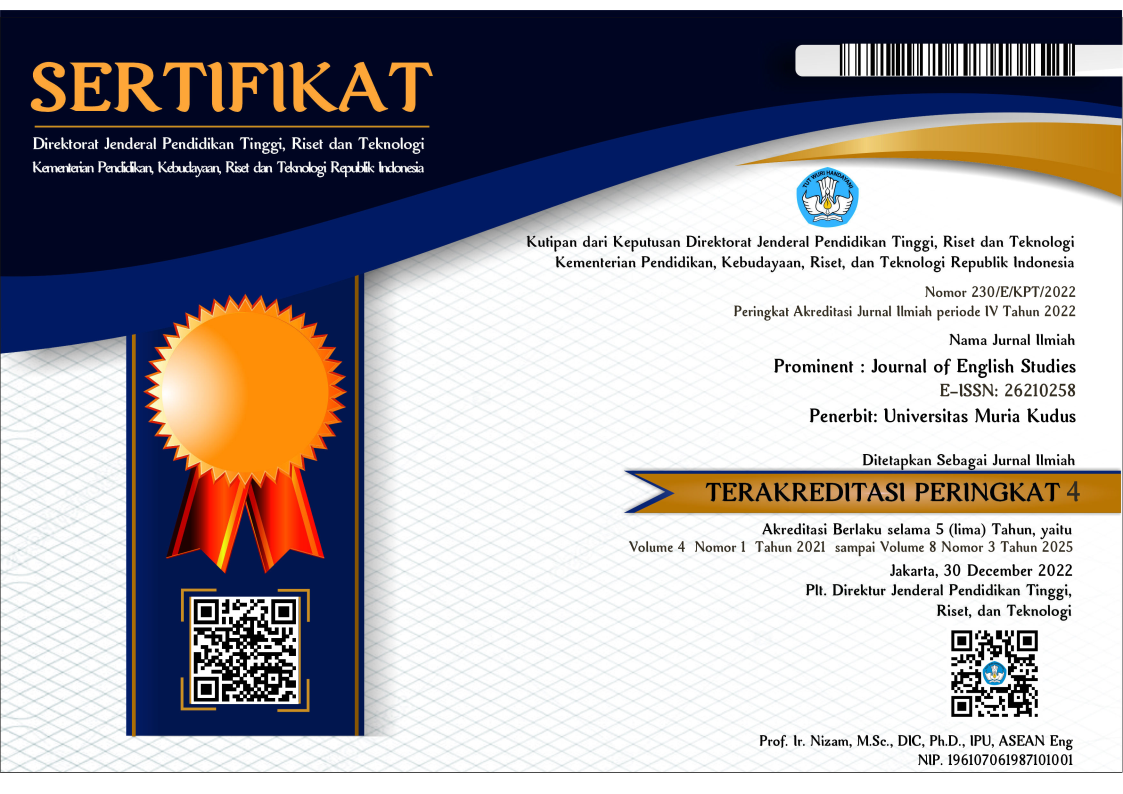THE EFFECTIVENESS OF ENGLISH SONGS FOR TEACHING ENGLISH TO YOUNG LEARNERS
Abstract
This study aims to analyze the differences in students' vocabulary & pronunciation skills with English songs as media. The choice of this topic was based on one of the problems that students often face, namely vocabulary & pronunciation skills. These abilities are some of the four important skills in English that must be mastered.
Researchers believe that people who learn English must master vocabulary & pronunciation. Using songs in the learning process is one of the media to teach children to master vocabulary & pronunciation. The participants in this study were fourth-grade students at SD 2 Hadipolo. The intended class is the fourth grade which has 18 students.
This research method is pre-experimental. Data was collected through pre-test and post-test. The researcher conducted a pre-test and then the students listened to the song for treatment. And the last step is the post-test.
Based on t0 being greater than the t-table, (10.238> 2.110), it means that H0 is rejected. The researcher concluded that there was a significant difference between the pre-test and post-test. The improvement of students can be seen from their average score from 53.3 in the pre-test to 78.88 in the post-test. It can be concluded that English songs are Effective as a tool for teaching vocabulary and pronunciation to fourth-grade students at SD 2 Hadipolo in the 2022/2023 academic year.
The researcher suggests the teacher use songs that meet the material. The researcher suggests to the students keep learning while listening to songs to add more knowledge. The other researcher can benefit from this study in a number of ways and use it as extra research material in the future.
Keywords
Full Text:
PDFReferences
Almutairi, M., & Shukri, N. (2016). Using Songs in Teaching Oral Skills to Young Learners: Teachers’ Views and Attitudes. International Journal of Linguistics, 8(6), 133. https://doi.org/10.5296/ijl.v8i6.10464
Antika, R., & Li, M. (n.d.). The Effects of English Songs in Learning Vocabulary for Young Learners The 10 th National Online Seminar on Linguitics, Language Teaching and Literature.
Arief, A., & Isnan, F. (2020). Children Songs as A Learning Media Used in Increasing Motivation and Learning Student in Elementary School. International Journal of Visual and Performing Arts, 2(1), 1–7. https://doi.org/10.31763/viperarts.v2i1.54
Džanić, N. D., & Pejić, A. (2016). The Effect of Using Songs On Young Learners and Their Motivation for Learning English. NETSOL: New Trends in Social and Liberal Sciences, 1(2), 40–54. https://doi.org/10.24819/netsol2016.8
Fadhila, E. (2022). EFFECTIVENESS OF USING ENGLISH SONGS TO IMPROVE VOCABULARY MASTERY AMONG EFL ELEMENTARY SCHOOL STUDENTS IN SETU BABAKAN AREA. ELLTER Journal, 3(2), 72–78. https://doi.org/10.22236/ellter.v3i2.10164
Farhat Jahara, S., & Hussein Abdelrady, A. (2021). Pronunciation Problems Encountered by EFL Learners: An Empirical Study. Arab World English Journal, 12(4), 194–212. https://doi.org/10.24093/awej/vol12no4.14
Farrah, M. A. A., & AL-Bakri, R. (2022). The Effectiveness of Using Poetry in Developing English Vocabulary, Pronunciation and Motivation of EFL Palestinian Students. Language Teaching, 2(1), p1. https://doi.org/10.30560/lt.v2n1p1
Hardiningsih, S., Akbar, M. R., & Sholihin, S. (2021). ANALYSIS OF ELEMENTARY SCHOOL TEACHER EDUCATION STUDENTS’ CREATIVITY IN CHANGING SONGS INTO SIGN LANGUAGES. PROGRES PENDIDIKAN, 2(2), 119–123. https://doi.org/10.29303/prospek.v2i2.149
Kuśnierek, A. (n.d.). The role of music and songs in teaching English vocabulary to students. www.worldscientificnews.com
Ma’rifat, D. (2017). A CASE STUDY OF USING SONGS IN TEACHING ENGLISH VOCABULARY TO YOUNG LEARNERS. In Journal of English and Education (Vol. 5, Issue 1). http://ejournal.upi.edu/index.php/L-E/article/view/9902
Millington, N. T. (2011). Using Songs Effectively to Teach English to Young Learners. Language Education in Asia, 2(1), 134–141. https://doi.org/10.5746/leia/11/v2/i1/a11/millington
Mintowati, M., Laksono, K., Mukhzamilah, M., Inayatillah, F., & Tyasnurita, R. (2020). The development of vocabulary for early-grade elementary-school students. 102–106. https://doi.org/10.32698/tech3242
Nur, G., & Liyaningsih, I. (2015). TEACHERS’ STRATEGIES IN TEACHING ENGLISH VOCABULARY TO YOUNG LEARNERS (A Descriptive Study on Teaching Vocabulary at the Third Grade Students of MI Kedungharjo in Academic Year Submitted as A Partial Requirements for the degree of Sarjana in English Education.
Palupi, D., Prasetyaningsih, E. T., & Bilandari, S. (2022). IMPROVING YOUNG LEARNERS’ PRONUNCIATION SKILL THROUGH SONGS. ETERNAL (English Teaching Journal), 13(1), 21–31. https://doi.org/10.26877/eternal.v13i1.10512
Permana, I. G. Y. (2020). Teaching Vocabulary for Elementary School Students. The Art of Teaching English as a Foreign Language, 1(2), 1–4. https://doi.org/10.36663/tatefl.v1i2.56
Permata Sari, I., Elvinna Asahra, E., & Siliwangi, I. (n.d.). IMPROVING STUDENTS’ VOCABULARY MASTERY USING ENGLISH SONG.
Ramadini, A., & Halimah, S. (n.d.). USING SONG TO IMPROVE VOCABULARY MASTERY FOR ELEMENTARY SCHOOL.
Rusiana. (2016). Improving Students’ Vocabulary Mastery through TPR Storytelling. Indonesian Journal of English Language Teaching and Applied Linguistics, 1(1). www.ijeltal.org
Studi Pendidikan Bahasa Inggris STKIP Muhammadiyah Pringsewu Lampung, P., & Kayyis, R. (n.d.). BUILDING VOCABULARY USING POP SONGS (Vol. 1, Issue 1).
Vančová, H. (2022). PRONUNCIATION EVALUATION CRITERIA FOR EFL LEARNERS. 164–168. https://doi.org/10.36315/2022v1end035
Widyastuti, R., Putri, G., & Saraswati, D. (2022). TEACHERS’ PERCEPTIONS ON THE IMPLEMENTATION OF POP SONGS AND ITS CHALLENGES TO TEACH PRONUNCIATION FOR YOUNG LEARNERS. JELLT (Journal of English Language and Literature Teaching), 7(2).
Yang, Z., & Kongjit, C. (2022). Improving the pronunciation of English learners through new learning process. International Journal of Evaluation and Research in Education, 11(2), 995–1004. https://doi.org/10.11591/ijere.v11i2.22195
DOI: https://doi.org/10.24176/pro.v7i2.10822
Refbacks
- There are currently no refbacks.
Prominent Journal of English Studies is licensed under a Creative Commons Attribution-ShareAlike 4.0 International License.
Dedicated to:

in Collaboration with APSPBI:






